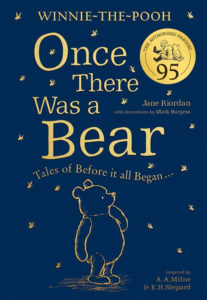What are your early memories of Winnie-the-Pooh? I can’t think of a time when I didn’t know A.A. Milne’s Winnie-the-Pooh stories – the poetry has also been in my head for as long as I can remember. I do remember though having a record with a sung version of Changing the Guard at Buckingham Palace which I loved because London was a very exotic and far-away place for me at the time.
I was lucky enough to grow up in the countryside, with a river at the bottom of the garden and nearby there is a bridge which we still call the Poohsticks bridge. I used to play Poohsticks there very calmly with my sister and sometimes in a much louder, riskier way with my naughty cousins – I don’t think that, like Eeyore, any of them actually fell in but they tried their best to!
What inspired you to write the prequel? In the original stories Winnie-the-Pooh lives in a tree in the Hundred Acre Wood but history tells us that he was bought from Harrods for Christopher Robin’s first birthday. I loved the idea of seeing Pooh and Eeyore and Piglet in London, in the nursery that is written about so much in the poetry and also out and about in London as well.
What adventures does the city hold for Pooh and friends? We know that Pooh in part got his name from a real bear in London Zoo, Winnipeg, or Winnie for short and so I couldn’t wait for them to meet in one of my stories. I couldn’t resist our Winnie being a little bit jealous of how much Christopher Robin admired the real bear. This is what Pooh had to say about that meeting: ‘“One bear in London is probably enough,”thought Pooh to himself, hoping it could be him.’
How difficult was it to recreate A.A. Milne’s style? A.A. Milne’s style is so distinctive and the characters have such strong voices that once I’ve decided where to take them, it’s as if I can hear them in my head, worrying, in the case of Piglet, or bemoaning something, in the case of Eeyore! Sometimes it’s more a question of asking them to hush so that the plot can move on! But that’s the beauty of Winnie-the-Pooh, it’s not so much about what happens in a story, it’s more about the characters’ observations and interactions – the smallest happenings can become big adventures.
What are your favourite Pooh moments? In the original stories there’s something about the pathos of the Eeyore birthday story that really resonates with me. When Pooh realises it’s Eeyore’s birthday and everyone has forgotten he rushes home to find a present for him, the detail I love is that he looks to see if he has ‘quite a small jar’ of honey… Of course the best-known part of the story is Piglet bursting the birthday balloon and Pooh eating the birthday honey but the pleasure Eeyore takes in putting his burst balloon in the jar and taking it out again, is so poignant and just brilliant.
What are your favourite words of wisdom from the original books? My favourite quote would have to be when Pooh pays a visit to Rabbit and Rabbit asks if he would like honey or condensed milk with his bread and he is so excited that he answers “both”, and then, so as to not seem rude, he added, “But don’t bother about the bread, please.”
What do you think made the Pooh stories such an instant hit? A.A. Milne was in fact already a successful and well-known writer, primarily a playwright before he became associated with Winnie-the-Pooh. Pooh Bear first appeared in Punch magazine before having his very own book written about him! But the poetry collections that first introduced audiences to Edward Bear were instant bestsellers, as were the three books that followed it. At the time Europe was still reeling from the First World War and A.A. Milne’s poems and stories offered a safe place for readers – the Hundred Acre Wood – and let’s not forget just how funny the stories are – they were the perfect distraction for adults and children alike.
Why do you think these stories continue to resonate with readers? No matter how much the world changes, some things remain timeless. The Pooh stories have a comforting, gentle wisdom that reminds us about the importance of friendship and the joy of simple pleasures. There’s a wonderful familiarity about shy Piglet, know-it-all Owl and bumbling Pooh. And a charming reassurance that everything will be OK in the end. Sometimes even the rainiest days can lead to the biggest adventures.
These are ideas that speak to readers across generations. It makes them perfect stories to escape to by yourself or read aloud together- something we know is enormously beneficial to children.














